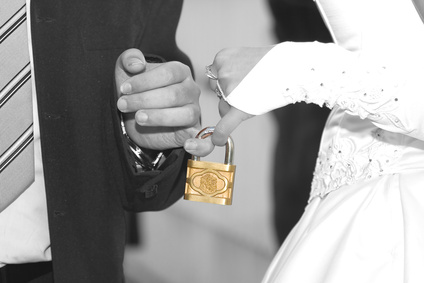One of the best parts of the online world is reading comments section. In the past, readers of traditional media wouldn’t be able to have much of a say unless they wrote a letter to the editor (and even that was no guarantee it would get published).
So, I enjoyed reading the 390 comments to the discussion Beverly Willett and I had in the New York Times’ Room for Debate on whether divorce should be harder to get. While I appreciate that more readers agreed with my stance — that divorce is hard enough without making people go to marriage education and waiting eight months in hopes of a reconciliation, and that divorce isn’t necessarily a bad thing — many readers said instead of making divorce harder, make marriage harder. 
Well, OK. My first impression was, yes, that’s a good idea. It’s just too easy for anyone to get hitched — not just the Kim Kardashians of the world, but also the 30 percent of women who say they knew they were making a mistake on their wedding day. That is an extremely disturbing percentage of women marrying for the “wrong” reasons (and I have to imagine a certain percentage of men are guilty, too).
But, what exactly should we do to make marriage harder, if anything?
Awhile ago, my The New I Do co-author, Susan Pease Gadoua, addressed this in Psychology Today (somewhat tongue-in-cheek):
Perhaps if the hassles and stressors occurred at the beginning of wedlock instead of the end, people might enter into it more soberly, that is, with more caution and understanding that it is a legal agreement not unlike that of a business partnership.
As it is now, the decision to marry is often accompanied by a proposal, then a wedding shower (with gifts), then the traditional pomp and circumstance of a wedding ceremony (with gifts), followed by a lovely honeymoon in a remote location. It’s all fun, romantic and more importantly, easy.
With the new procedure, the historical spectacle of getting down on one knee and asking her (or him) to marry would be substituted by the unglamorous service of process.
It hardly sounds romantic, but perhaps that is exactly what marriage needs — a reality slap in the face.
It’s lovely to marry for love and for all the other reasons we marry — some that are meaningful for the couple, but that others tend to judge, like the marriage between Hugh Hefner, 86, and his new bride, Crystal Harris, 26 — but marriage is just a legal contract, albeit with emotions and social significance attached. Should those who are considering marry understand exactly what their legal requirements are?
Yes, says David Allen Green, legal correspondent of the New Statesman, who suggests legal advice for anyone considering marriage wouldn’t be such a bad idea:
A commercial transaction of comparable value — say a share acquisition or a disposal of assets — would normally be accompanied by lawyerly advice: seeking contractual protections, guarantees, and amounts in escrow. Various adverse outcomes would be discussed with harsh and open realism, and the parties would allocate risks and rights of termination accordingly. And once both parties were properly advised, and had mutually agreed the legal outcomes of various unhappy scenarios, then there would be a cooling-off period of 12 months before the agreement had legal effect.
Indeed, the world would be a far happier place if marriage was harder and divorce easier. There would be far fewer divorce lawyers if there were more marriage lawyers, just as companies that are realistic and well-advised when they negotiate a contract tend not to get bogged down subsequently in messy litigation.
The upshot, he says, is that although fewer might choose to marry, those who went through with it anyway might truly live up to their “till death do us part” vow.
Still, how do we make marriage “harder”? Should you have to be a certain age, earn a certain income, have a life plan, make premarital counseling mandatory, wait a certain amount of time after applying for a marriage license, take a test (of what, I’m not sure, but go with me here), take parenting classes if you plan to have kids (since society doesn’t seem to care too much about childfree couples who divorce), learn how to communicate about finances, or all of the above?
And, if we make marriage harder, does that mean more people would choose to opt out marriage altogether and cohabit (which doesn’t seem to be any better an alternative to marriage)?
- Do you think we need to make it harder for people to marry?
- What do you think couples who want to marry should have to do?
- Would it make a difference if they wanted to have kids or not?
















